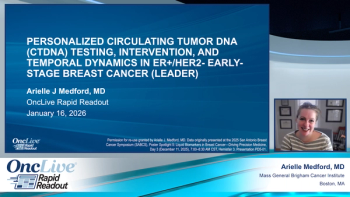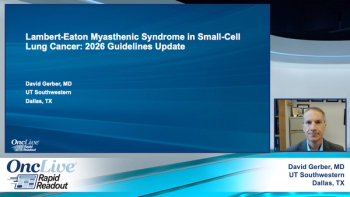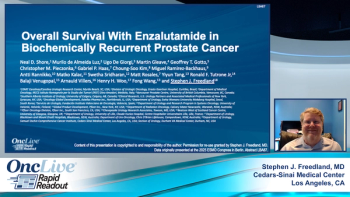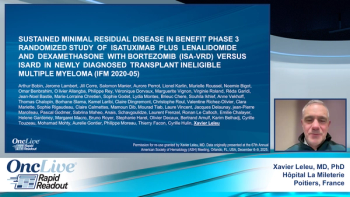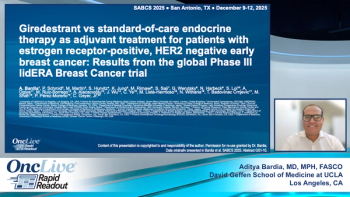
|Videos|July 1, 2021
Rapid Readouts: Updated data from a pooled analysis of larotrectinib in TRK fusion-positive cancers
Alexander Drilon, MD presents updated results from a pooled analysis of TRK fusion-positive cancers treated with larotrectinib from the 2021 American Society of Clinical Oncology annual meeting.
Advertisement
Alexander Drilon, MD, discusses data from the following poster:
- Long-term efficacy and safety of larotrectinib in an integrated data set of patients with TRK fusion cancer (Hong, et al. ASCO 2021. Poster 3108.)
- The objective of this poster is to report pooled data from 3 clinical trials (NCT02576431, NCT02122913, NCT02637687) of patients with TRK fusion–positive cancers treated with larotrectinib.
- Baseline characteristics
- Patient population by tumor type (n = 218): soft tissue sarcoma, 26%; infantile fibrosarcoma, 20%; thyroid, 13%; salivary gland, 11%; lung, 9%; colon, 4%; melanoma, 3%; breast, 3%; and other, 3%
- NTRK gene fusion (N = 218): NTRK1, 44%; NTRK2, 3%; and NTRK3, 53%
- Conclusions: efficacy
- In all evaluable patients (n = 206), the overall response rate (ORR) was 75%, including 45 (22%) complete responses, 109 (53%) partial responses, 33 (16%) with stable disease, 13 (6%) with progressive disease, and 6 (3%) not determined; responses were durable with a median progression-free survival (PFS) of 35.4 months and a median duration of response of 49.3 months. Median overall survival (OS) was not reached.
- The 36-month rates for duration of response, PFS, and OS were 54%, 48%, and 77%, respectively.
- In patients with central nervous system metastases (n = 15), the ORR was 73%, including 11 (73%) partial responses, 2 (13%) with stable disease, and 2 (13%) with progressive disease.
- Conclusions: safety
- There were no new or unexpected safety signals.
- Treatment-related adverse events (TRAEs) were predominantly grade 1 to 2.
- Grade 3 and 4 TRAEs were reported in 18% of patients, with the most common being decreased neutrophil count (7%), increased aminotransferase (3%), and increased aspartate aminotransferase (2%).
Advertisement
Latest CME
Advertisement
Advertisement
Trending on OncLive
1
Single-Center, Retrospective Data Show Low Rate of Lifileucel Infusion Following Referral in Advanced Melanoma
2
Long-Term Cilta-Cel Data Show Low Rates of PFS Events in Standard-Risk R/R Myeloma
3
Real-World Data Support Clinical Benefit With Lifileucel in Previously Treated Advanced Melanoma
4
Dr Riedell on the Long-Term Efficacy of Tisa-Cel in R/R Follicular Lymphoma
5


